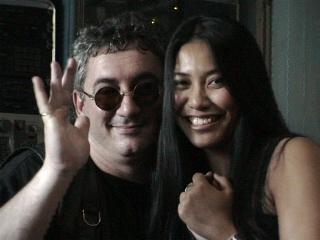
By Nico Colombant for The Indonesian Observer, Paris, 1997
If Anggun left to seek anonymity, she has failed. On the cobblestone streets of her neighborhood in Bastille, where the French revolution was fought 200 years ago, passersby stop, gaping at her beauty, wondering if she isn't that exotic Indonesian singer they saw on the tv talk show and heard on the radio.
The singer never tires of the admiration, never refuses to tell her faraway tale. Music journalists here call her "every critic's favorite interview." "My name means 'grace created in a dream'," she purs over and over. Anggun, 24, has also learned how to say pop chart in French. The French-version feature track of her international debut album - Snow on the Sahara - melted the hearts of teenage radio executives and became one of last summer's biggest hits on national airwaves. In what became a whirlwind of pack publicity, her face was splashed all over the pages of teeny-bopper magazines and she was interviewed by every Gaelic talk show host on prime time television.
But as Anggun is wont to explain, her story is not one of sheer marketing or good cosmetics alone. "My dream has always been to reach universal qualities in my music," she explains. "And for me to make this dream come true, that means hard work, more hard work, perseverance and patience." Parisians, lovers of many types of world music, are perfect hosts.
However, her first stop outside Indonesia was London, a city which felt more like a damp sock than a yellow brick road. "Great for clubbing but that's not really my scene, I'm more of a homebody in fact. Too much cranky weather for me over there, all gloomy and sad."
"This first album with Sony France is not about me being Indonesian, or Asian or someone fabricated I'm not. It's about myself, reaching out to others, taking my listeners on a voyage to different seasons and landscapes, through the sensitivity of my femininity," Anggun explains.
For two years, she studied effortlessly to master the language of romance, and learned her way around Paris, going to flea markets, getting her exercise by running after pigeons, and trying to eat cheese. She has adapted to her new life admirably, gone luging in the Alps, believes the cold is good for creativity and seems at ease in the company of French people.
She is very discreet about her private life, refusing to give out any interviews at her spacious apartment on the east side of the city, near the national opera. The man of her life is a middle-aged Frenchman and during the week when he is off to work, he calls home to remind his wife to eat, because when she starts practicing the piano, she often forgets.
In August, she was in Jakarta for a short stop to promote the album, downing several Tehbotol drinks right when she arrived at the airport, filling up her lungs with all the kretek smell she could, and eating all the fried rice that came by her way. But her first time back in four years was for business not pleasure, and before long, she was waving good-byes to family and friends, leaving once again to seek more fame and fortune.
"I have this gut feeling," she says. "I needed to leave Indonesia, here I had done what I could do. I am a singer, not a model or an actress. I want to expand my singing and music, to bring to others and to learn from others."
 It is in France that Anggun's dream of global fame is taking hold and she is handling the task with all the dignity and aloofness that you would expect from her Javanese heritage.
It is in France that Anggun's dream of global fame is taking hold and she is handling the task with all the dignity and aloofness that you would expect from her Javanese heritage. And most spoke about everything but her music. "She has come to the world for the joy of the senses," wrote one journalist. "She is a lotus flower, a Javanese princess, a dancer in our dreams," commented another.
And most spoke about everything but her music. "She has come to the world for the joy of the senses," wrote one journalist. "She is a lotus flower, a Javanese princess, a dancer in our dreams," commented another. Anggun was looking for a musical mate and she found him in Erick Benzi, a French producer of among others the Canadian Celine Dion and the Algerian Cheb Khaled. Benzi took Anggun to Paris to embark on a musical adventure, on the strength of her beauty, her singing presence and his savvy in the musical industry.
Anggun was looking for a musical mate and she found him in Erick Benzi, a French producer of among others the Canadian Celine Dion and the Algerian Cheb Khaled. Benzi took Anggun to Paris to embark on a musical adventure, on the strength of her beauty, her singing presence and his savvy in the musical industry. 
 But now Anggun is more often than not, on the road away from her potted plants and Parisian habits, busily promoting the international version of her trilingual album, in French, Bahassa Indonesia and English. The past few months have taken her to Japan, Finland, Switzerland, Canada and New York City.
But now Anggun is more often than not, on the road away from her potted plants and Parisian habits, busily promoting the international version of her trilingual album, in French, Bahassa Indonesia and English. The past few months have taken her to Japan, Finland, Switzerland, Canada and New York City.
For westerners, she has advice: "I tell people not to complain too much about life. You have to accept life and make do with what you have. Maybe because people here have so many choices, they always want more."